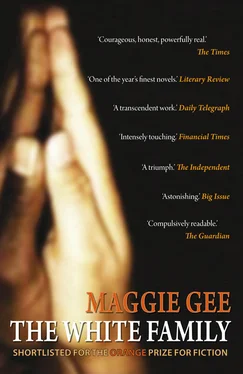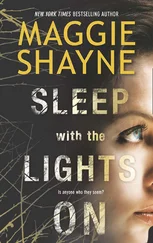The doorbell goes and a girl comes in. One of the regulars. Posh little cow. Big eyes, skinny. George has always been a dirty old man. He’s sweet on this one. Always has been.
‘All right George? You look a bit tired.’ She’s got one of those voices. Pretend caring. I bet she’s hard as nails, really.
‘Melissa, dear. How very nice to see you.’ Cough, cough, spraying the counter. ‘The old chest is playing up this morning … What can I do you for today?’
I’ve heard that line so often I could puke.
‘I’m just wondering if you keep aspirin. I’ve got a bit of a headache … I really miss our chemist, you know. It was so nice to have a local chemist.’
The chemist closed six months ago. And the lav shop will close. Windsor Drainage next door. It stands to reason that’s got to go. Who’s going to shop for lavs down here? This shop won’t close though. People like tat.
‘That’ll be one pound thirty-five. Yes, pity about the chemist. Betting-shop’s doing nicely though.’
‘Huge now, isn’t it?’
‘Shows some people have money to spend.’
‘If they had, why on earth would they be living here?’ And she gives a big grin, like she’s really smart, like she really knows something about this area, and then Ms Melissa is off with her aspirin.
They come and live here. People like her. Middle-class people, who fancy themselves. They go down the end where the slums used to be. They ponce around in jeeps and things, I see them, couples, laughing together, talking in loud stupid voices, and fucking queers, fucking arse-bandits — I know they look down their noses at us. They’re only here till they can afford to get out.
I shan’t do that. I’ll stay here and — prosper. That is the word. Be prosperous.
I had a bit of a talk with Darren, last night. Of course, I didn’t give everything away. But he is my brother. And he gave me respect. Together we set the world to rights, though he didn’t agree with me about the Jews –
But he thinks I’ve got lots of bright ideas. He thinks I’m on the right lines, with the shop. He says he’s shafted without his computer.
He even came up with some names for the business. I mean words are his manor, selling is mine. MediaNet was one suggestion.
‘Proprietor D. White, Esquire.’
They do sometimes write that underneath, I’ve seen it.
May walked furtively past the paper-shop. It was bad enough being at home with the boy. She had done her best to — tell him, last night — he had a right to know, he was their son — but he hadn’t seemed to take anything in. She supposed he couldn’t help it, but it made her feel worse. As if she would always be alone, from now on. In any case, she usually made a point of not going in when Dirk was working. It annoyed the boy, and she felt ashamed to see him lounging in a fug of smoke. He thought he worked hard, but there was nothing much to do, because even she could see the shop was failing. Alfred denied it, but that meant nothing. Being a woman, she faced facts.
Besides, she preferred the shop down the road, which had a much better choice of magazines and cards. Perhaps Dirk could get himself a job down there, though the staff all seemed to be busy young Asians — The wrapping paper was infinitely better, not that thin shiny stuff that wouldn’t fold. They made a feature of presents, there. May had bought a dozen sheets at Christmas, then hidden it, so Dirk wouldn’t see. Alfred accused her of disloyalty, but that was men; unrealistic. May liked to think she was a realist.
When it was wet, May’s bags seemed to shrink, and her pockets got twisted, so nothing fitted, nothing went in, nothing came out. Her knuckles grew bigger, her hands clumsier. As she walked, she was trying to pull on her gloves, put away her keys, check she had her purse. List. She had a list, or ought to have a list. She tugged it out at last from the depths of her handbag and watched as the rain sent it spidery, illegible, struggling to fold it and shove it back in. And her keys got caught in the wool of her glove, came clanking out and fell on the floor. May bent, sighing, and picked them up. The rain on the pavements was black and sour. Did no one clean the pavements any more?
She ached inside. She ached for Alfred. Without Alfred, she was older, more stupid. Alfred was a lump where her heart should be.
But she heard him talk to her. This won’t do. Buck up, May. This isn’t like you .
She straightened her coat and walked on more briskly. She didn’t want the neighbours to think she was defeated. The curtains would twitch, and they’d say ‘There she goes. Looks to me as if he isn’t going to get better.’
Well whatever the doctors said, they were wrong. May made herself smile, like a wife, not a widow; made herself think about him coming home, for she wouldn’t let them keep him in hospital. She knew her husband better than they did.
Even if it came to the unspeakable thing. He couldn’t die there. She wouldn’t allow it. Alfred could always depend on her. She had brought back his boots, when he asked her to. Had shoved them in his cupboard with the blooming greatcoat. And Sister had turned a blind eye, bless her, whatever the rules and regulations … He felt a lot better once his boots were there.
And thinking of that, she felt cheerful again, for she had a purpose, she had a use. She would be his rock; if need be, his soldier. The things that he had been to her.
She was going to the off-licence first. Was there a hospital rule against alcohol? No one had mentioned it, if there was. She found herself grinning like a schoolgirl. He loved his beer, always had done. At a time like this, he should have his comforts. She wouldn’t take in great clinking bottles of beer, but miniature whiskies might do the trick. He could tuck them away in his bedside cupboard.
The girl in the off-licence seemed half-asleep, pallid and bored, disinclined to chat. She looked too young to be working there, but May smiled at her, and thanked her nicely, which made the girl’s lips twist into a sort of sneer. As she bent towards May with the change, May smelled her breath. Some kind of spirit, which was sad. She had read about it in the papers, how all the young women liked to drink these days, but that poor girl should have been in school.
At least we’ve still got an off-licence. Not that we use it much, normally, but … Things should be there, in case you need them. That’s how it used to be, round here. That’s how it was until — when did it start dying?
We used to have everything here, she thought. Hillesden Rise was like a village. We used to have a bank; that went in ninety-four. And a building society. That vanished soon after. And the chemist — that went six months ago. She’d seen it coming; Mr Frost had been depressed, especially since the incident last year when two drug addicts beat him with the butt of a gun. She wouldn’t say it to Shirley, but both of them were black … The most innocent remarks offended her daughter. Two flower-shops; both of them had gone under. Served them right for charging too much, though she missed the great lilies and the golden chrysanthemums waving at her behind the glass. Two shoe-shops; gone. Where she bought the kids’ shoes. Their first tiny sandals, their sensible school-shoes. Now there was just a man who did repairs, an Indian, a gruff old thing who reminded her of her own father, sitting in the dark all day, hammering and sticking, helped by shrill-voiced women who were daughters or granddaughters. (You wouldn’t catch an English family doing that, these days, though I helped my father, when I was a kid.)
Once we had a bakery-cum-cake-shop. She used to buy gingerbread men for the kids, and a sponge on Saturdays, since hers always sagged. It was — an ornament to the high street, the cake-shop, a sign of the prosperity that came with the fifties. May used to like sniffing the air outside: eggs, sugar, butter, vanilla. But the shop changed hands some time in the eighties; they brought in rubbish baked in Kilburn. By the time they folded, no one much cared … There was a solicitor’s where May and Alfred had made their wills twenty years ago, when it seemed like a joke that they would ever need them. That only survived the bank by a year. Electrical Goods; went in ninety-six. Hardware store; ditto. Jewellers; late eighties. May missed the jewellers; it was romantic, looking in at the second-hand rings and lockets and lucky charms, gleaming on the velvet. She had liked old Hymie, who also mended watches, and never minded getting things out of the window even though he knew May was only looking. (He was … partial to her, when she was younger, when they were both young; a lifetime ago.) But he got too nervous, after three or four break-ins, the last one with him present, in broad daylight. He didn’t resist, but they still broke his jaw. ‘My wife says, “Hymie, it’s just not worth it.”’
Читать дальше












